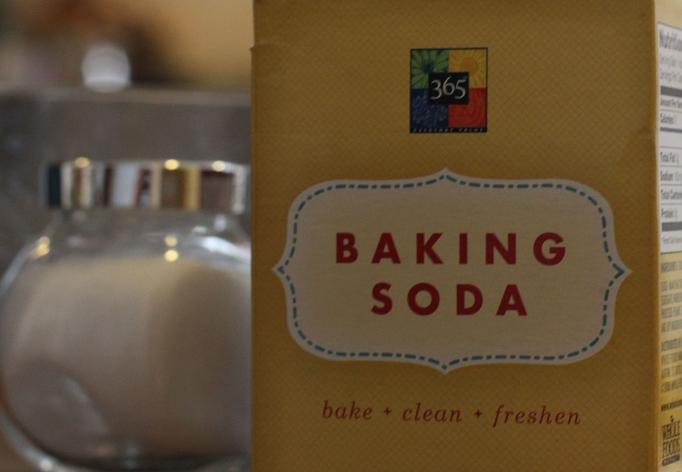18 Uncommon Uses for Baking Soda
This post may contain affiliate links, including those from Amazon.com, which means we earn a small commission off your purchases. And here's the thing: We only mention services and products that we think are truly worth your attention, whether they're free, paid, or otherwise. This site relies on YOUR trust, so if we don't stand behind a product 110%, it's not mentioned. Period.
[dropcap]B[/dropcap]aking soda is one of my favorite frugal items to have around the house in great quantities. It has obvious culinary uses and it's also great for cleaning, absorbing odors, and personal care. If you're looking for ways to make simple changes in your home that are frugal and support a sustainable lifestyle, using baking soda is an incredibly cheap way to take care of so many needs in the home!
Here are 17 ways to use baking soda that you may or may not know of:
Cleaning stove tops – making a thick paste of baking soda and water is a sure-fire way to scrub off cooking splatter and films of grease of your stove top
Laundry additive – add 1/2 cup to your next load of laundry as a natural way to soften clothes and help lift dirt off the fabrics
Dishwasher additive – toss 1/2 cup into the dishwasher before turning it on to help gently scrub food residue off of your dishes
Deodorant – use an old make-up brush to dust baking soda under your arms after a shower in place of deodorant. This works surprisingly well.
Odor absorber – Arm & Hammer brand has an entire marketing campaign for using baking soda in the refrigerator to absorb odors, but you can also use it in the freezer, cupboards, shoes, or anywhere else that needs a bit of freshening.
Relief for stings, bites, and rashes – make a thick paste of baking soda and water and use as a poultice to relieve bee stings, sunburn, jellyfish stings, and poison ivy
Take a baking soda bath to relieve skin irritations – Add 2-3 cups of baking soda to your next bath to relieve itching.
Toothpaste – either add a bit of baking soda to your current toothpaste or scrub your teeth with it prior to brushing to gently remove plaque. Add in a thin spray of hydrogen peroxide for an especially thorough cleaning.
Pot and pan abrasive, including non-sticks – baking soda is a safe way to scrub pots and pans, including non-stick ones, which usually needs a bit of extra care to stay in good shape
Kid's play – make a very thick paste on a baking sheet and let your kids create… whatever! It's super-easy clean-up too, which isn't always the case with play dough…
Heartburn remedy – Mix 1 Tbls of baking soda into an 8 oz glass of water and sip as much of it as you can stand. This method has worked wonders for me, especially in late pregnancy, but if you have heart issues, are prone to high blood pressure, or have been told to adhere to a low-sodium diet, use this with GREAT caution or avoid it completely. Even if you don't have any of the aforementioned issues, USE THIS METHOD SPARINGLY, as the chemical reaction that happens in your stomach which makes the method so effective also creates excess salts as byproducts, so your body will have a heavy salt load to deal with if you use this method often.
Fire extinguisher – keep a mason jar with baking soda handy so you'll always be ready to toss a liberal amount on a small fire. This is especially helpful for cooking grease fires.
Stainless steel and chrome polish – make a thick paste to rub on stainless steel and chrome to shine them up. When you're done, buff it with a dry cloth and they'll look as good as new.
Apply a thick paste to a corroded auto battery terminal – the corrosion will dissolve and you can then wash the corrosion away.
Drain cleaner – Pour 1 cup of baking soda down the drain followed by 1/4 cup of white vinegar. Let it sit and bubble for 5-10 minutes, then pour boiling water down to rinse it away, along with any scum it has loosened. This works best as a preventative measure to keep pipes clog-free, especially in the bathtub, but I've also had moderate success with it to loosen clogs in the kitchen sink.
Shine up your kitchen and bathroom – rub a paste of baking soda and water over your faucets and sinks, then rinse and buff them dry for beautifully shined appliances.
Clean bath toys – use an old toothbrush and a thick baking soda paste to scrub bath toys, which are especially susceptible to mold and other grossness. It's an excellent scrubber and it's absolutely safe for children.
Science experiments – the simple combination of baking soda and vinegar to create volcanoes certainly is common, but it's worth mentioning anyway because it's just so much fun! Give your kids an excuse to play with chemical reactions and discover carbon dioxide bubbles by building a clay volcano, and putting water, baking soda, and vinegar in the cone.





I have a child with a bacterial infection in the throat and it was suggested to take 1/4 tsp in some juice once a day to help kill the bacteria and make the body more alkaline to inhibit bacteria growth. What do you think? Makes sense to me.
In the last several months I have used only baking soda as a cleaner around my house and have been looking for uses such as personal care. I had read that it can be used as a deodorant and I was skeptical. It really works well. I mixed a drop of jojoba oil in with it and I have been amazed how well it has worked-actually better than my store bought deodorant/anti perspirant.
Thank You!
I love baking soda for a lot of reasons. As far as the drain cleaning procedure goes, I was wondering if that would be septic safe? I use baking soda in my hair in the shower and apple cider vinegar as a leave in conditioner. But I have never noticed a reaction so I don’t know if white vinegar would different and/or safe for septic systems.
Please let me know if you can find any answers.
In all of my research, I’ve never run across anything that would indicate any type of vinegar would be unsafe for septic systems. In fact, I would think it would be beneficial by creating a slightly acidic environment, which would help keep certain bacteria at bay and assist in the breakdown of the bio-organic sludge.
If anyone knows any differently, please chime in, but I say go for it!